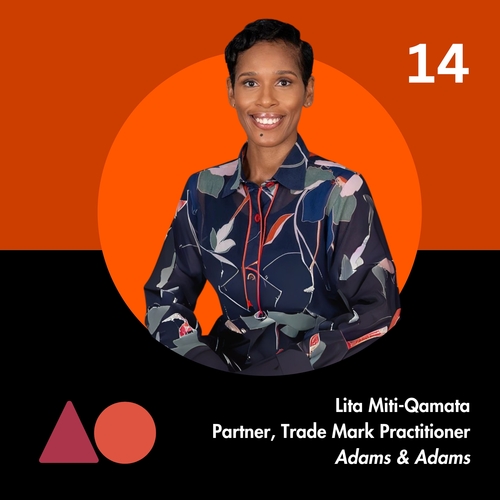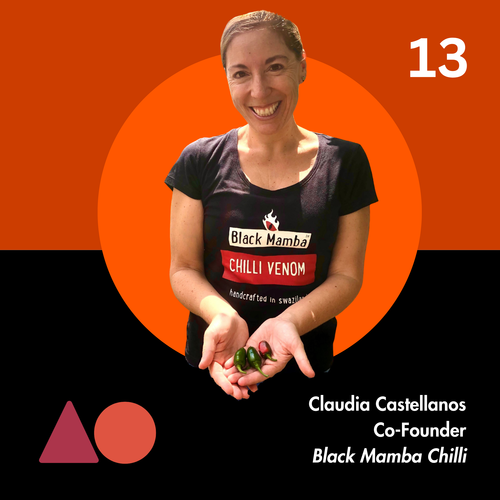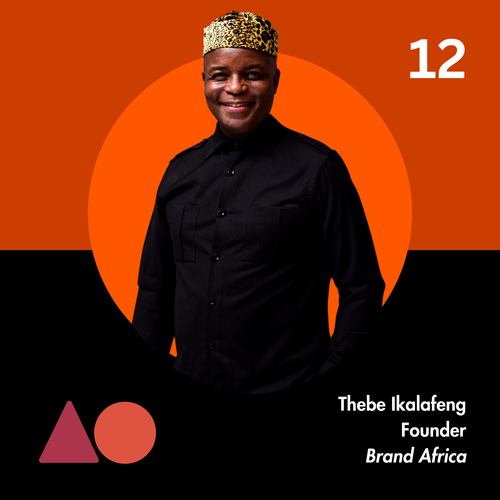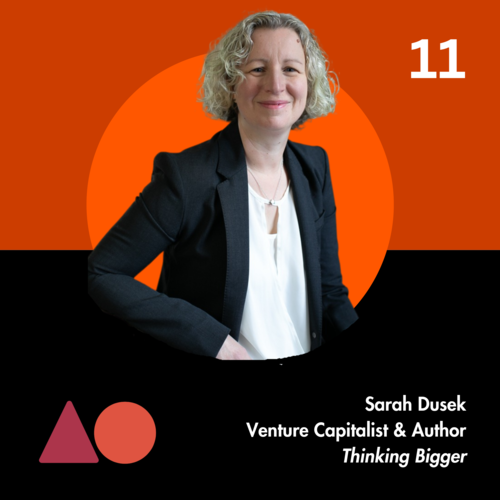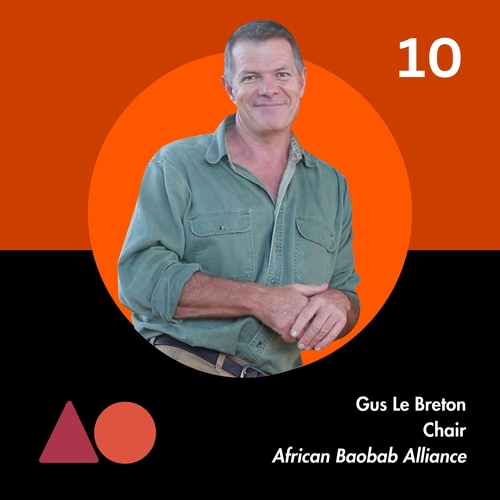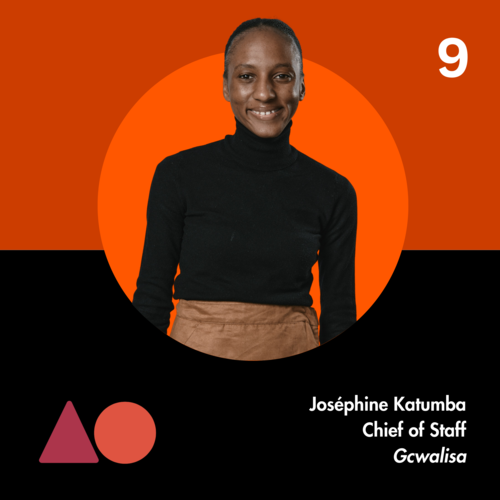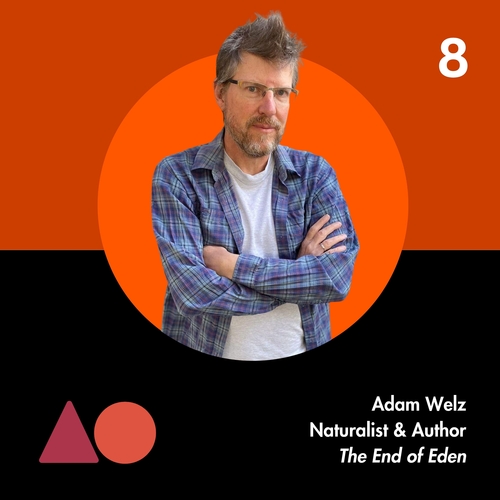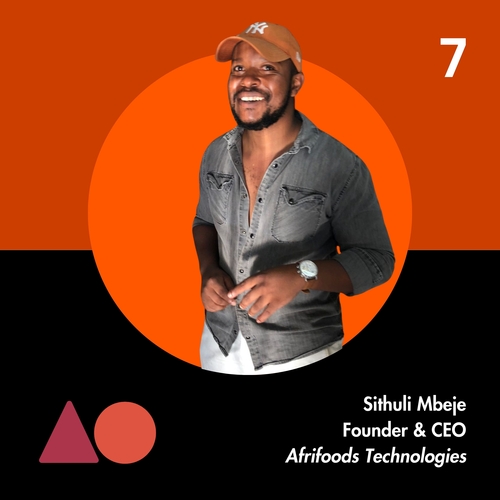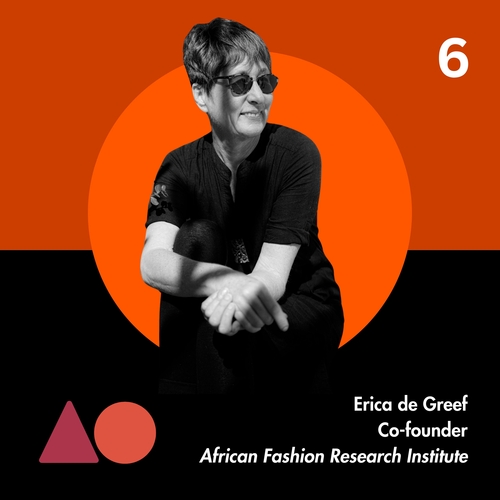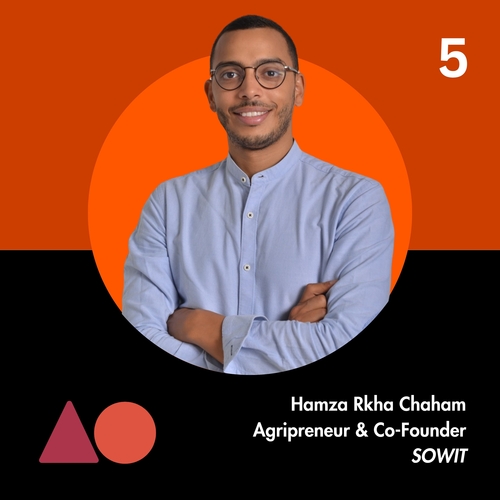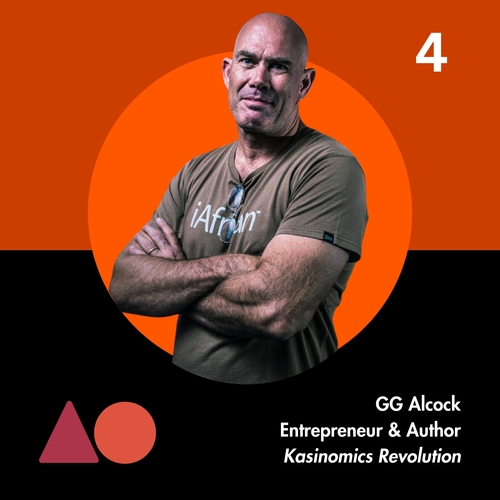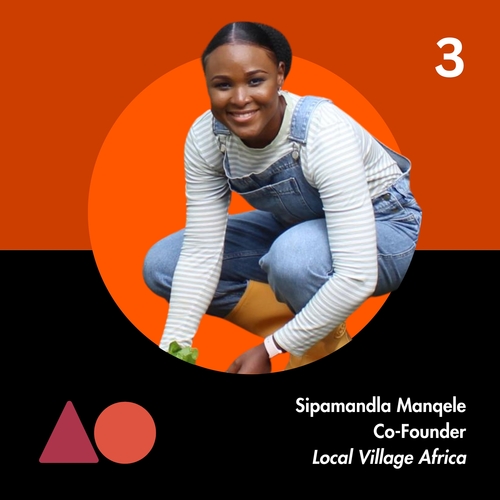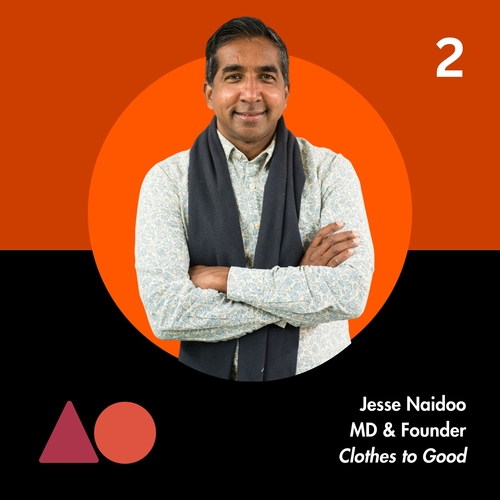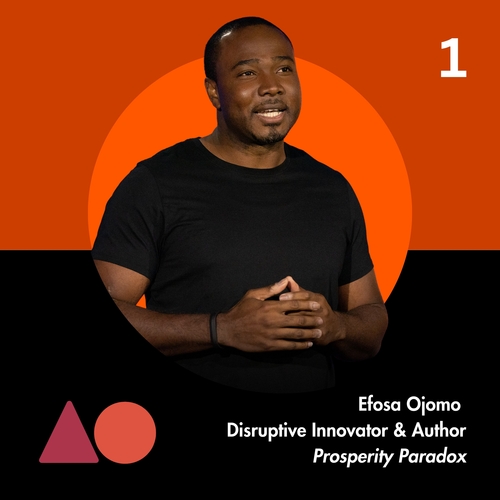Discover AfricanOptimist - how we thrive against great odds
AfricanOptimist - how we thrive against great odds

AfricanOptimist - how we thrive against great odds
Author: AfricanOptimist
Subscribed: 2Played: 1Subscribe
Share
© AfricanOptimist
Description
What does it take to survive and thrive in Africa?
This and other questions are answered weekly as we dive into the worlds of dynamic doers and thinkers who are changing the future of the continent. Join Sanja Gohre in conversation with a wide range of people as they share their journeys of triumphs and tribulations, tips and tricks, analysis and insight, and most of all their inspiration on how and why they survive and thrive.
For the back story of all guests, transcripts and show notes, visit www.africanoptimist.co.za, where you can also sign up for the AfricanOptimist newsletter.
The AfricanOptimist podcast is proudly hosted by Afripods, the world's Nr 1 podcast for African stories.
14 Episodes
Reverse
Masterclass on intellectual property with IP lawyer Lita Miti-Qamata from law firm Adams & Adams.Two years ago, Mita stood up at an IP workshop in Johannesburg, pulled out a Coke can, and made intellectual property law make sense to me for the first time. 'Everything you need to know about IP is right here on this can,' she said, and then delivered the clearest explanation of trademark law probably everyone in that room had ever heard. I knew right then I had to get her on the podcast.Here's something that might surprise you: while 'protect your IP' has become a rallying cry among African entrepreneurs and business owners, African brands account for just 2% of the world's 11.6 million trademark filings. There's clearly a gap between knowing we should protect our intellectual property and actually doing it.In this conversation, IP lawyer Lita Miti-Qamata from Adams and Adams walks us through why that Coke can holds the key to understanding intellectual property protection. She explains why Coca-Cola's CEO would grab the company's trademark certificates before anything else if their building was on fire, and tells us how bizarre it can get - somebody actually managed to trademark the smell of freshly cut grass.This is the first episode in our IP series. Lita breaks down the five types of intellectual property you can protect, then takes us deep into trademarks: what they are, how to apply for them, how to think strategically about international protection, and why having a long-term IP strategy isn't just legal housekeeping—it's essential for building real wealth over time from your ideas.If you've ever felt overwhelmed by intellectual property law or wondered whether it's worth the effort, this conversation will change how you think about protecting the intangible assets that could—and should—become your most valuable business assets.For more info on Lita, a transcript and show notes, visit Lita's guest page on the AfricanOptimist website (africanoptimist.co.za).TIME STAMPS00:26 – What is Intellectual Property (IP)?00:53 – Africa's share of registered trademarks01:15 – Guest Introduction: Lita Miti-Qamata02:40 – Workshop for creatives and IP05:25 – The Five Types of Intellectual Property08:51 – Trademarks vs. Brands11:17 – Copyright explained12:21 – Trade secrets and confidential information14:43 – Patents and designs16:45 – How long does IP protection last?19:31 – Registering and protecting your trademark22:00 – The value of a registered trademark25:20 – Trademarks as business assets27:55 – Enforcing your rights without registration31:20 – How to start the trademark application process34:20 – Choosing the right owner for your trademark36:13 – What can be trademarked?38:20 – The Nice Classification system41:00 – Prioritizing what to protect44:09 – Staggering protection as your business grows47:08 – Trademark ownership and rights50:59 – Registering in other countries and regions54:02 – WIPO and international registration57:36 – First to file vs. first to use01:00:14 – Working with Thebe Magugu (fashion designer)01:08:26 – Cultural appropriation and IP01:13:48 – Can you trademark common terms?01:17:12 – What fails to get registered?01:21:25 – The state of trademark registration in Africa01:24:48 – Closing remarks and where to find more information
AfricanOptimist #13 Claudia Castellanos - How you dust off an old family recipe and build it into a super hot brand, while being fair to suppliers and the planet.We hold a delightful conversation with entrepreneur and self-proclaimed food rebel Claudia Castellanos who takes us on the rollercoaster ride of growing an international business that started with her and her husband's first sell out of 400 bottles of chilli sauce from a tiny stand at a music festival in Eswatini, southern Africa. What follows is nothing short of a gutsy tale of what it really takes to turn a single recipe, on a fat-stained paper, into an international, super hot brand with a venomous bite.This, despite insisting on local production, permaculture training, organic certification, glass bottles, pure ingredients, and facing revolving staff at retailers, naysayers who don't get it, crazy deadlines and serious competition from rows and rows of other chilli sauces sitting neatly on supermarket shelves.Claudia was very generous in her sharing of every detail. It is a rare insight into how a couple who knew nothing about retail, and manufacturing, in a country not known for its chillies, managed to build something truly special.If you need a touch of inspiration, and a load of really well-earned and practical business advice - this episode is for you!For more info on Claudia, a transcript and show notes, visit Claudia's guest page on the africanoptimist website (africanoptimist.co.za).TIME STAMPS00:00 Introduction to the African Optimist Podcast00:23 Claudia Castanos: The Birth of Black Mamba01:21 Values Over Profit: The Philosophy Behind Black Mamba02:52 Claudia's Journey: From Colombia to Eswatini12:04 The First Recipe and Launch at Bushfire Festival21:19 Building the Brand: Challenges and Successes31:01 Expanding Distribution and Overcoming Obstacles39:34 Sourcing Chillies from Smallholder Farmers42:36 High Value Crops and Farmer Partnerships43:59 Initial Farmer Reactions and Market Access46:38 Challenges and Solutions in Crop Production54:50 Scaling Production and Food Safety01:09:41 Recipe Development and Product Innovation01:17:10 Future Challenges and Optimism
Meet the founder of Brand Africa, Dr Thebe Ikalafeng.Once decked out in immaculate corporate suits, he is now a walking celebration of African creativity and haute couture, a mentor to many a young talented creative bubbling up through the entrepreneurial ranks and a passionate promoter and protector of all things branded African.Much is written and broadcast about this award-winning marketer. But now he has written a book in which he is the teller of his marketing tales and his turn away from corporate and big brand marketing towards marketing an entire continent. This episode delves into some of the key moments that marked this journey.We cover his pursuit of excellence from an early age, his 'almost career' as an accountant, studies in the United States before South Africa became a democracy and why when destiny calls, your only job is to listen and follow.We explore his time as Nike's Chief Marketing Officer for Africa, and why he turned his back on some big money in the corporate world to focus solely on promoting African brands. We then dig deeper into what a brand-led African Renaissance means, how you can market a continent through brands, and why it is so important for African leaders to 'put Africa first'.We also cover the founding of his organisation Brand Africa, and the insights of its flagship programme, the Brand Africa 100 survey (and how he created it from scratch) and why the survey consistently has shown 'how Africans say one thing, and do another' instead of buying African products.He emphasizes the importance of visiting African countries for oneself, and why he decided to visit every single country on the continent following a conversation with Samsung Africa CEO KK Parks. Thebe does not suffer fools lightly and looks to a future filled with action, rather than backward, in regret. Asked about where he gets the energy from to do what he does, he laughed and said, 'You sleep when you're dead.' He is a whirlwind of action, who epitomises his own mantra.Through his travels, his organisations, his insights and regular talks, Thebe has shown us all another side of what happens up and down the continent, and is one of the most passionate and knowledgeable advocates for African brands you will ever meet.Settle in for a fantastic listen to the life of the African Traveller, Dr Thebe Ikalafeng.For more info on Thebe, a transcript and show notes, visit Thebe's guest page on the africanoptimist website (africanoptimist.co.za)Time Stamps:00:00 Introduction to the African Optimist Podcast00:25 Meet the Guest: Intro to a Marketing Icon01:33 Affirmations of African Identity02:25 The Journey of Self-Discovery02:55 The Book: A Different Perspective on Africa03:31 Marketing Mastery with Nike05:16 Iconic Campaigns and Creative Risks07:41 A Passion for Marketing09:32 Life and Studies Abroad11:04 Returning to a New South Africa12:36 Following One's Destiny16:39 Corporate Offers and Entrepreneurial Decisions20:23 Building African Brands26:06 Branding Africa: The World Cup and Beyond27:06 Redefining Africa's Agenda Through Branding28:20 The Power of Brands in Shaping National Identity29:54 Challenges and Opportunities in Branding Africa32:11 Establishing the Brand Africa 100 Metric34:51 The Gap Between Trust in African Products and Buying African Products37:58 The Importance of Intra-Africa Trade40:00 Learning from Global Branding Success Stories43:21 The Role of Intellectual Property in African Branding45:11 Personal Contributions to African Branding48:28 The Need for Political Will and Local Agenda-Setting56:03 Thebe's Journey Across Africa and Its Impact on him59:53 Countering Negative Narratives with Optimism01:01:51 Conclusion
#11 Sarah Dusek - on becoming an entrepreneur who thinks BIG, and a venture capitalist who helps African women think BIGGER - an insider's guide to scaling and pitching your business.Take a wild entrepreneurial ride with Sarah Dusek, entrepreneur, venture capitalist and author of Thinking Bigger, a powerful guide to growing a business, scaling a business and pitching a business for more money than most women dare to imagine. In this episode, Sarah shares tactical advice on the shift in mindset that is required to grow big businesses as a female entrepreneur, and candidly speaks about how she had to come unstuck from outdated notions on motherhood and a woman's traditional 'helper' role in order to build her business - which she sold for a whopping $100 million ten years after she launched it.In her book, Sarah highlights the fact that currently less than 2 percent of women-owned businesses do more than $1 million in revenue annually and only 2 percent of all venture capital dollars yearly goes towards funding female entrepreneurs. The book, and this interview, are part of Sarah's mission to demystify the world of fundraising and the basic building blocks needed to systematically and tenaciously pivot and push until a minimum viable product is created that can ultimately scale.If you read one entrepreneur book this year, let it be Thinking Bigger, and if you only listen to one entrepreneur's intrepid and inspiring journey, let it be this episode. Sarah masterfully weaves her thoughts on why female entrepreneurs play too small, with practical advice on how to draft a winning pitch deck for something big, all the while sharing her personal success story of growing a business from four tents on a family farm to an international luxury lifestyle brand known for pioneering glamping.For more information on Sarah Dusek, visit her page on the AfricanOptimist website, where you can find her bio, show notes and episode transcript.Never want to miss an episode? Visit our website and subscribe to the AfricanOptimist newsletter. Time Stamps00:00 Introduction to the AfricanOptimist Podcast01:18 Sarah Dusek's Journey: From Zimbabwe to Montana06:00 The Birth of Under Canvas09:57 Challenges and Pivots in Entrepreneurship20:16 Overcoming Doubts and Embracing Risks29:24 The Tent Rental Business33:10 Creating a Tented Hotel Experience36:57 Overcoming Initial Challenges37:48 Living Conditions and Staff Dynamics38:37 Realizing the Business Potential that Can Scale41:14 Understanding Venture Capital42:47 Shifting Mindsets and Building Value49:56 The Importance of a Pitch Deck54:44 Facing the VC World01:02:02 Embracing Thoughtful Capitalism01:05:41 Empowering Female Entrepreneurs01:11:58 Conclusion
AfricanOptimist Episode #10 Gus Le Breton - On influencing EU law, the challenges of processing wild-harvested fruit, the future power of baobab harvesters and the need for 'courage, my son' It is hard not to think of the Greek myth of Sisyphus when you listen to Gus le Breton tell the unfolding story of the production and sale of the African indigenous baobab fruit. Much like the Greek king Sisyphus who was condemned by the Greek god Zeus to keep rolling a stone up a hill only to see it roll back down again when he reaches the top, Gus seems to face a new challenge just as he deals with an old one in this telling of his baobab tale.At face value, this episode seems like an entrepreneur's story of how to create and export an indigenous food. But it is so much more than that. It is the open account of the struggles and successes of an almost 30-year journey to make the unique African baobabs (a keystone species of the planet) economically viable, in the hope that this can reduce poverty for its wild harvesters and lead to the long-term preservation of this ancient resource. It is also a masterclass in the details of what it takes to get to market, influence legislation and create demand for what nature has to offer, but many take for granted.And unlike Sisyphus, Gus did manage to successfully push some big boulders over the hill, and also loves his work and does not see it as punishment. But his cautionary tale still holds. Perseverance is key. For more information on Gus Le Breton, visit his page on the AfricanOptimist website, where you can find his bio, show notes and episode transcript.Never want to miss an episode? Visit our website and subscribe to the AfricanOptimist newsletter. TIME STAMPS00:00 Introduction to Baobab and Initial Reactions00:38 Welcome to the African Optimist Podcast00:51 The Baobab Tree: A Natural Marvel02:06 Gus le Breton: The African Plant Hunter03:52 Challenges in Commercializing Baobab05:23 Early Efforts and Setbacks07:11 The Struggle with Industrial Agriculture10:31 The Journey to Market Baobab20:16 Navigating Regulatory Hurdles31:46 The Importance of Wild Harvesting34:04 Processing Baobab: Challenges and Solutions38:36 Challenges of Traditional Baobab Processing39:43 Ensuring Quality and Standardization40:35 Formation of the African Baobab Alliance42:11 Collaboration vs. Competition44:11 Creating Demand for Baobab48:14 Marketing Challenges and Success Stories54:37 The Superfood Debate57:13 Importance of Research and Consumer Awareness59:25 Fair Trade and Value Distribution01:07:29 Future Prospects and Investor Insights01:08:38 Final Thoughts and Encouragement
AfricanOptimist Episode #9 Joséphine Katumba - The rise (and importance) of the Intrapreneur, jumping on rocket ships without a reserved seat and 'weighing and paying' as a retail model of the future In this episode, you will learn a couple of things. Firstly, you will get a behind the scenes look at how you take an idea (let's face it, haven't we all had them - 'One day I will open…' 'Some day I will sell…') and turn it into reality. And secondly, how you can do this not only as an entrepreneur, but as an intrapreneur within an organisation. Just as exciting, at much less personal risk.Our guest Joséphine Katumba shares how, while growing her own small business, she was recruited by celebrity entrepreneur himself, Miles Kubheka (from 'Vuyo' fame and founder of the Wakanda Food Accelerator) to help create Gcwalisa, an exciting 'weigh and pay' mini retail model first piloted in Johannesburg's Alexandra township (developed in 1912 as the only place where Africans could buy freehold land, and now adjacent to Sandton (one of the richest suburbs of Johannesburg).Joséphine takes us on the two-year journey of growing Gcwalisa into a model pilot mini retailer that is now on the brink of scaling up and expanding its horizons. With her signature calm voice and in matter-of-fact detail, we get a glimpse of the iteration and patience required to birth a brand new baby, that lets you buy food for the money you have in your pocket or in exactly the quantities you need.Joséphine is the picture of Zen, and could grow anything she puts her mind to. Join me in finding out how she does it. And why.For more information on Joséphine Katumba, visit her page on the AfricanOptimist website, where you can find her bio, show notes and episode transcript.Never want to miss an episode? Visit our AfricanOptimist website and subscribe to the AfricanOptimist newsletter. TIME STAMPS00:00 Embracing the Unknown: Cheryl Sandberg's Google Analogy00:41 Introducing the African Optimist Podcast00:54 The Journey of an Intrapreneur: Meeting Joséphine Katumba01:07 Josephine's Entrepreneurial Spirit Meets Miles Kubheka12:56 Designing and Implementing the Gcwalisa Model18:03 Community Feedback and Adjusting the Offering21:31 Understanding Gcwalisa's Impact and Philosophy28:24 Exploring the Poverty Tax and Packaging Solutions28:47 Customer Journey and Packaging Innovations at Gcwalisa29:48 Shifting Consumer Behaviour and Environmental Impact31:19 Understanding Gcwalisa's Customer Demographics33:57 Real-life Customer Stories: Impact and Gratitude40:50 The Business Model and Scaling Up41:21 The Importance of Patience in Business Growth43:57 Facing Competition and Maintaining Originality46:51 Challenges and Learnings49:55 From Entrepreneur to Intrapreneur: A Personal Journey55:37 Closing Remarks and Resources
Introducing naturalist David Attenborough's successor...In this episode, ecologist Adam Welz gives us a peak into the writing of his first book The End of Eden and his intentions as well as his difficulties in writing it. He explains why he chose to focus on wild species as the characters of the bigger climate change story, and how he told small stories within a bigger context, and supported by scientific research, to paint the grim picture of a planet breaking down. We delve into why he sees it as important to reframe the 'limp' phrase 'climate change' and to understand the many linked effects global warming has on all the wild species around us.Adam's book and this interview helped me look past the usual clichés that are splashed across the mass media pages, and see a different world, with different eyes, and a much better understanding of how to make sense of the isolated shifts that are happening in nature. Shifts that are small, but taken as a networked whole, create a looming terrifying instability and 'age of uncertainty' befalling our world. I knew Adam over 30 years ago, but that is not why I am encouraging you to read his book. As a communicator and writer myself, I understand how hard his job was and how magnificently he has done it. Enjoy this conversation, but the meat is in the book.For more information on Adam Welz, visit his page on the AfricanOptimist website, where you can find his bio, show notes and episode transcript.Never want to miss an episode? Visit our AfricanOptimist website and subscribe to the AfricanOptimist newsletter. Time Stamps 00:00 Into Quote Adam Welz00:54 Podcast intro02:51 Adam Welz gives an overview of his first book 'The End of Eden'05:40 Why Adam focuses on wild species and not humans to tell the story of climate change07:33 Bridging the gap between micro stories of wild species and a greater context of their situation08:48 'I want you to try and understand what it's like to be a non-human.'10:16 Adam as naturalist filmmaker David Attenborough's successor11:29 Why the intro of the book is based in new York City12:50 You can see the effects of climate change all around you, if you just look, even in big cities15:57 The lessons we can learn from surviving species18:15 What we need to survive in this Age of Uncertainty 20:04 Stability of nature in the past 11.000 years22:49 Climate breakdown as a more accurate description than climate change24:28 The role of cognitive linguistics framing 'climate change' in a particular way in our minds29:38 The 200,000 - 300,000 years: Earth's Eden31:34 How South Africa saved homo sapiens from extinction31:34 How Adam crafted stories that elicit empathy for wild species in the reader40:58 How writing the book affected Adam personally41:40 Adam's 'oh shit' moment regarding climate breakdown42:57 The effect of seeing Australia's 2019/2020 bushfires personally45:30 The isolation felt by scientists who are constantly exposed to climate change data47:33 New opportunities present themselves as we all have to move away from fossil fuels50:09 Earth-changing events do happen - think of Apartheid and the Dissolution of the Soviet Union, and the ubiquity of cell phones within a very short period of time53:40 Before you come up with solutions, you have to understand.55:45 'You actually have got to be quite careful where you plant trees. They're not all just a great thing everywhere - you have to plant the right trees in the right places.57:10 The response to the book58:39 Adam's next book
In Episode 1, disruptive thinker and author Efosa Ojomo highlighted that the potential for prosperity in Africa lies in finding solutions to persistent problems and in doing so, creating new markets.In this episode, we shine a light on Sithuli Mbeje's journey to developing a mobile abattoir - his response to the problems faced by livestock farmers across Africa when they want to convert their cows to meat. In graphic details he outlines the different steps involved in this process, both in the large industrial abattoirs, as well as his much smaller and compact roving mobile unit.In our conversation he speaks about what gave him the idea for a mobile abattoir, how it fits into his philosophy on food waste and food security and how it is still possible to create value even if you do not follow a linear growth model. He highlights how mobile abattoirs can also serve an important role during outbreaks in foot and mouth disease, a recurring problem across many countries in Africa, as well as in conservation projects that rely on collaborative efforts between farmers and conservation agencies.He speaks of his drive to combine knowledge gained from years in the food processing and retail space with his understanding of food practices back home in rural KwaZulu-Natal, South Africa, to create new food processes and systems to ensure a more sustainable meat supply chain across Africa.For more information on Sithuli Mbeje, visit his page on the AfricanOptimist website, where you can find his bio, show notes and episode transcript.Never want to miss an episode? Visit our AfricanOptimist website and subscribe to the AfricanOptimist newsletter.
In 2023, Vogue Business named Erica de Greef and African Fashion Research Institute (AFRI) co-founder Lesiba Mabitsela as part of a group of 100 'next-gen entrepreneurs and agitators' in the global fashion world, who are overhauling the current system and designing a different future. In this episode, we unpack why Vogue gave them that accolade, how Erica sees fashion as a decolonising tool, what different stories need to be told and how a different approach to fashion can tell those, what to do with White clothes collections buried inside South African and other museums, and how a single archived dress can be re-imagined to fill the gaps in Africa's fashion history.It is only as recent as 2016 that 'Africa' and 'Fashion' were used together in the same sentence, and Erica very evocatively explains why. She also explains why the term 'slow fashion' might not be the most suitable, or chosen, term for fashion in Africa.It is only in the last twenty years that South Africa started to develop its own local fashion brands, and in this episode Erica reveals the part she played in that development. For those wishing to understand the past erasure of African fashion and its relegation to ethnographic museums and descriptions - and the work being done to change that - this episode is for you.For more information on Erica de Greef, visit her page on the AfricanOptimist website, where you can find her bio, show notes and episode transcript.Never want to miss an episode? Visit our AfricanOptimist website and subscribe to the AfricanOptimist newsletter.
In this episode, we could have focused on the tech side of agriculture with Moroccan agripreneur Hamza Chaham, because it is digital technology that is really turning agriculture into an exciting scientifically based business. And his company, SOWIT, is using AI powered tools like sensors and probes, trackers and drones, in their work with farmers, government and food producers to successfully help optimize yields.For Hamza, however, this is not where the hope for food security lies.Agritech involves powerful tools, but it is the farmer who ultimately needs to use them. And given that the majority of smallholder farmers grow their crops on a mere 12% of the worlds farmland, yet feed 80% of people in Asia and sub-Saharan Africa, it is with these smallholder farmers, where tech can have the biggest impact in the future.But how to get this tech into the hands of farmers, who often are not digitally savvy and rely on traditional methods to grow their food?That is the focus of today's insightful conversation with Hamza as he shares his journey to understanding that the farmer, is at the centre of the push for innovation and food security, not technology.For more information on Hamza Chaham, visit his AfricanOptimist guest page, where you can find his bio, show notes and episode transcript.Never want to miss an episode? Visit our AfricanOptimist website and subscribe to the AfricanOptimist newsletter.
South African GG Alcock has made it his life's mission to help people understand how informal economies work and to relieve you of the prejudices and stereotypes you may harbour about this sector.As somebody who has a foot each in the informal and the formal economy, and because of his unique upbringing and 'first-person' understanding of Zulu culture in South Africa, he is in a unique position to be a messenger on both, to both sides.The conversation covers a wide range of topics, and includes his thoughts on the misunderstood stigma of South Africa being the most unequal country in the world, what the biggest import - hair extensions! - tells us about the SA economy, why families from other countries seem to dominate the spaza (small grocery store) sector, and how rich township business owners would rather go cashless and pay tax, than bear the risk of storing and carrying millions of rands, in cash.Visit GG's AfricanOptimist guest page for his bio, show notes, transcripts and more or africanoptimist.co.za to sign up for the AO newsletter.
South African Sipamandla Manqele is a food alchemist, transforming wholesome African ingredients into delicious, nutritious - and convenient - products. She is the co-founder of localvillageafrica, whose mission it is to secure a seat for African food at the global banquet table.For more information on Sipamandla Manqele, visit her AfricanOptimist guest page. Never want to miss an episode? Visit the AfricanOptimist website and subscribe to the AfricanOptimist newsletter.
Former South African engineer turned Social Entrepreneur Jesse Naidoo shares his journey to Master of recycling textile waste, explaining the opportunities that exist for a single item of clothes in a circular economy. He talks to the AfricanOptimist about the exciting new developments in waste recycling and about creating shared value among communities, not shareholder value. For more information on Jesse Naidoo and Clothes to Good, visit his AfricanOptimist guest page. Never want to miss an episode? Visit the AfricanOptimist website and subscribe to the AfricanOptimist newsletter.
Nigerian Efosa Ojomo, co-author of 'Prosperity Paradox', sits down with the AfricanOptimist to share insights into the power of market-creating innovations across Africa and the potential they have to lift African countries out of poverty at scale.For more information on Efosa Ojomo and his book, visit his AfricanOptimist guest page. Never want to miss an episode? Visit the AfricanOptimist website and subscribe to the AfricanOptimist newsletter.


